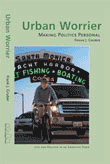By Frank Gruber
December 14, 2009 -- I reported last week that the Planning
Commission's review of the draft text of the new land use and
circulation elements (LUCE) of Santa Monica's general plan would
have to wait until at least January, because that would be the
earliest date by which the City will have released the draft environmental
impact report (EIR) for the LUCE.
It looks like the commission will have to wait until April to
make comments on the document.
That is because the City Attorney's office informed the commission,
at its meeting last Wednesday, that the commission cannot work
on revisions to the draft LUCE until there is a final EIR to evaluate
alongside it. The final EIR will not be prepared until after completion
of the public comment period on the draft EIR, which will continue
for at least 45 days after the draft EIR is released to the public.
In response to public comments, the draft EIR will be revised,
and a "final" EIR will not be available until April
at the earliest. I placed "final" within quotation marks,
because in fact an EIR is not final until the decision-making
body (in this case not the Planning Commission, but the City Council)
certifies the EIR.
According to the City Attorney's office, the time for the planning
commissioners to comment on the adequacy of the EIR is when the
commission finally reviews the somewhat-more-final EIR along with
the draft LUCE.
If this seems like a silly delay to you, then you are in agreement
with the commissioners, who were incredulous that they would not
be able, along with members of the public, to comment on the draft
EIR. As Commissioner Jay Johnson said, by the time the draft EIR
had been revised, the "horse [would be] out of the barn."
I'm sympathetic to the commissioners, and the process would benefit
if they can give their comments to the draft EIR in the review
period. The delay, however, should not have much impact on the
overall schedule for adopting the LUCE, as the commissioners'
chapter-by-chapter review of the draft LUCE cannot occur until
they have the post-comment version of the EIR in front of them.
In retrospect, I have to wonder why so much time was spent on
preparation and review of the LUCE "Strategy Framework"
that the Planning Department released in June 2008. This (long
and comprehensive) document covered virtually all of the substance
of what's in the draft LUCE, but not in "plan language."
Wouldn't it have made more sense to go straight to a draft of
the LUCE?
Then the Planning Commission, followed by the City Council, could
have reviewed that draft, and then the resulting revised draft
-- representing specifically what the City government would want
-- would have been the subject of environmental review before
the commission and the council adopted a final LUCE.
Instead, the commissioners and then the members of the City Council
will be simultaneously dealing with the language of the LUCE and
the EIR, rather than using the EIR to evaluate a draft of the
LUCE that they had previously, subject to environmental review,
approved.
One reason why a two-year process became a six-year process.
* * *
Speaking of the LUCE, one of the controversies about it has swirled
around its goal of allowing development but not a net increase in
the amount of car trips. Opponents of the plan have expressed skepticism
about how this could be achieved. |
To see what can be done when traffic is attacked directly, at the
source, i.e., by making driving more inconvenient and alternatives
more convenient, rather than indirectly, through limiting development,
which has never worked, I recommend taking a look at an article
about traffic on the UCLA campus that appeared last week in UCLA
Today, the newsletter for UCLA faculty and staff.
According to the article ("Putting
a car-driven culture in reverse", since 2003 the number
of vehicles on campus has dropped from 126,000 per day to 110,000,
a 13 percent decline. Only 37 percent of UCLA commuters now drive
alone to campus; the comparable figure for Los Angeles is 74 percent.
The reasons for the drop: aggressive efforts to provide and improve
alternatives to solo driving and increased residential density in
the form of more on-campus student housing.
* * *
Last week was one during which many congratulations were warranted
among notable Santa Monicans (and soon-to-be Santa Monicans).
Council Member Richard Bloom was, as reported
in The Lookout, appointed to the Coastal Commission.
Planning Commissioner Gwynne Pugh's architectural firm, Pugh +
Scarpa, won the highly, and I mean highly, prestigious "firm
award" awarded to one architectural firm each year by the American
Institute of Architects. According to the AIA's press release, "The
[award] is based on its 35 years of consistent excellent work, including
[Pugh + Scarpa's] seamless blending of architecture, art, and craft;
community involvement; attention to sustainable design; and nurturing
of in-house talent. The AIA Architecture Firm Award, given annually,
is the highest honor the AIA bestows on an architecture firm".
Perhaps more of a welcome than congratulations are due to Rod Gould,
who in January will become Santa
Monica's new city manager. It's clear from his resume, and confirmed
by people I heard from both inside and outside Santa Monica, that
Mr. Gould's peers rate him among the most capable of all of California
city managers. Only 52, he's run cities for already almost 20 years.
What we'll have to see, of course, is if he has what it takes to
manage a city that is larger and which has a larger and more complex
government, and which is decidedly more urban, than the cities (San
Rafael and Poway) that Mr. Gould has managed before. But as I said,
he's only 52 and he must be looking forward to new challenges.
The most happy congratulations go out to City Council Member Kevin
McKeown, who last week married Genise Schnitman . In true Santa
Monica style, the happy couple, who knew each other somewhat for
ten years or so, truly became involved with each other as they both
worked on various election campaigns, including the one for Mr.
McKeown's reelection in 2006. Best wishes to them both.
* * *
Amid all the good news, I would be remiss not to send out best
wishes for a speedy recovery to Mayor Ken Genser, who has been hospitalized
for the past month. Let's hope he'll been back in the center of
the dais soon.
Frank
J. Gruber is the author of Urban Worrier: Making Politics Personal,
available at Hennessey + Ingalls and Angel City books in Santa Monica,
at City Image Press,
and on amazon.com. |




